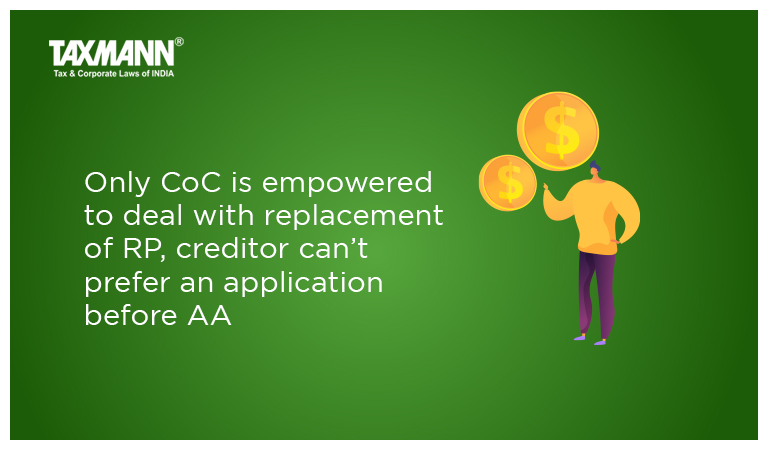Only CoC is empowered to deal with replacement of RP, creditor can’t prefer an application before AA
- Blog|News|Insolvency and Bankruptcy Code|
- 2 Min Read
- By Taxmann
- |
- Last Updated on 6 September, 2022

Case Details: Veeral Controls (P.) Ltd. v. Regen Powertech (P.) Ltd. - [2022] 141 taxmann.com 490 (NCLAT-Chennai)
Judiciary and Counsel Details
-
- M. Venugopal, Judicial Member & Kanthi Narahari, Technical Member
- K. Gaurav Kumar, Practising Company Secretary for the Appellant.
- P.H. Arvindh Pandian, Sr. Adv. & A.G. Sathyanarayana, Adv. for the Respondent.
Facts of the Case
In the instant case, the CIRP was initiated against the corporate debtor and the resolution professional (RP) was appointed. Pursuant to that the appellant-operational creditor of the corporate debtor filed a claim before RP for the outstanding dues in respect of the goods supplied to the corporate debtor and that the RP had admitted the claim of the appellant.
Consequently, the appellant filed an application u/s 27 of the IBC to replace the RP on the ground that RP had wilfully not disclosed before the Tribunal that he was undergoing contempt proceedings and show cause notice had been issued against him and, therefore, he was ineligible to be appointed as RP.
The Adjudicating Authority (NCLT) by an impugned order dismissed said application on the ground that the appellant was not entitled to file an application seeking replacement of RP since such provisions for replacement of RP had been envisaged only under sections 22 and 27 of the IBC.
Further, it held that the NCLT couldn’t enforce disciplinary proceedings against IRP/RP and only IBBI would be competent authority to initiate disciplinary proceedings against the IRP/RP.
The appellant filed an instant appeal on the ground that the NCLT had committed an error in not appreciating the principles under the IBC.
The NCLAT observed that Section 27 of the IBC enjoins that a ‘resolution professional’ may be replaced at any time, during ‘CIRP’ by the ‘committee of creditors’ with a 66% majority of voting shares subject to the written ‘consent’ purported ‘resolution professional’. The fact of the matter is that the ‘committee of creditors’ do have the right to replace such ‘resolution professional’ when they suspected collusion between the ‘resolution professional’ and the ‘management’.
The NCLAT, further observed that if the ‘resolution professional’ is required to be replaced by the ‘committee of creditors’ then the ‘adjudicating authority’ is bound to consider the name proposed by the ‘committee of creditors’.
NCLAT Held
The NCLAT held that when there is an express provision namely section 27, which unerringly deals with ‘Replacement of Resolution Professional by Committee of Creditors’, then the same is to be followed/adhered to by ‘litigant’/’stakeholders’ and others connected with IBC.
Further, the NCLAT held that in terms of section 27 of IBC, CoC is only empowered to deal with ‘Replacement of RP’, thus the provisions of section 27(1) are ‘self-explanatory in nature. Therefore, the appellant was not eligible to prefer an application before the Adjudicating Authority for the replacement of RP. Accordingly, the appeal was to be dismissed.
List of Cases Reviewed
-
- Order of NCLT – Chennai in IA/971/IB/2021 in IBA/1099/2019, dated- 1-2-2022 (para 28) affirmed.
Disclaimer: The content/information published on the website is only for general information of the user and shall not be construed as legal advice. While the Taxmann has exercised reasonable efforts to ensure the veracity of information/content published, Taxmann shall be under no liability in any manner whatsoever for incorrect information, if any.

Taxmann Publications has a dedicated in-house Research & Editorial Team. This team consists of a team of Chartered Accountants, Company Secretaries, and Lawyers. This team works under the guidance and supervision of editor-in-chief Mr Rakesh Bhargava.
The Research and Editorial Team is responsible for developing reliable and accurate content for the readers. The team follows the six-sigma approach to achieve the benchmark of zero error in its publications and research platforms. The team ensures that the following publication guidelines are thoroughly followed while developing the content:
- The statutory material is obtained only from the authorized and reliable sources
- All the latest developments in the judicial and legislative fields are covered
- Prepare the analytical write-ups on current, controversial, and important issues to help the readers to understand the concept and its implications
- Every content published by Taxmann is complete, accurate and lucid
- All evidence-based statements are supported with proper reference to Section, Circular No., Notification No. or citations
- The golden rules of grammar, style and consistency are thoroughly followed
- Font and size that’s easy to read and remain consistent across all imprint and digital publications are applied



 CA | CS | CMA
CA | CS | CMA
